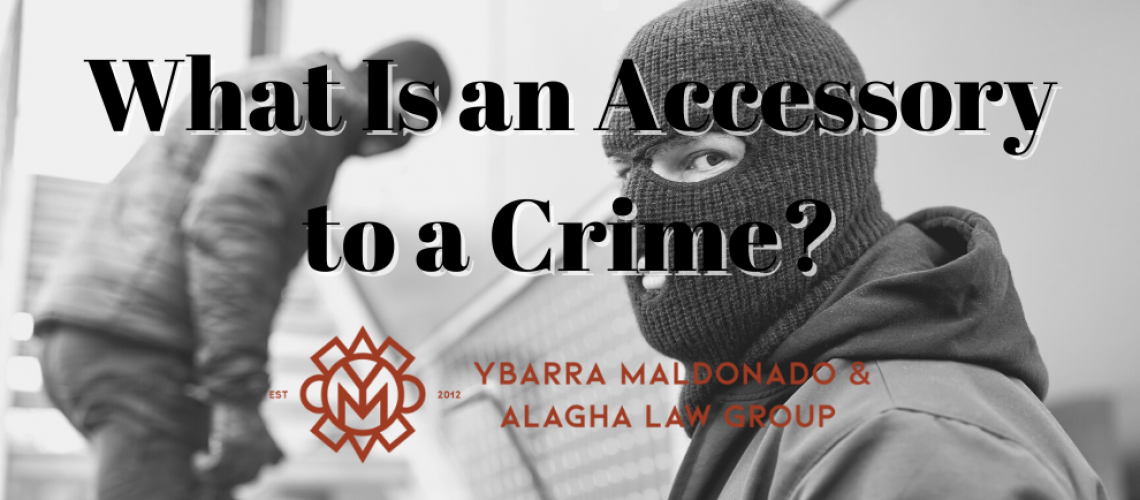When you face misdemeanor or felony crime charges in Arizona, you need an attorney who has extensive experience in criminal defense. Many believe that, to be charged as an accessory to a crime, they must be present at the time of its commission. This is simply not true. You can be charged as an accessory before the fact or an accessory after the fact. This depends on when you helped the principal offender. Ybarra Maldonado Law Group stand ready to offer only the best Phoenix criminal defense attorneys.
Our criminal defense attorneys establish each attorney client relationship on the basis of trust. Any sensitive or confidential information that you share with us always remains private. Our law firm strives for excellence in all areas of practice, including criminal defense, Phoenix personal injury, and immigration. Our accident attorneys in Phoenix are highly skilled at defending the rights of our clients and doing everything in our power to secure a recovery on their behalf. To schedule a case evaluation with us, please call 602-910-4040 today, or fill out our online intake form.
What Does It Mean to Be an Accessory to a Crime?

Being an accessory to a crime means that you helped the principal offender either commit a crime or get away with a crime. It is a very serious criminal offense. It is not necessary to plan in advance to be considered an accessory. You also do not have to know that a crime would occur or even be present for the crime committed. You can still be charged as an accessory.
What Is Aiding and Abetting a Crime?
Three commonly confused crimes are aiding, abetting, and being an accessory to a crime. Below, we outline the definitions of each.
- Aiding involves supporting, helping, or providing assistance to another person in committing a crime.
- Abetting involves encouraging or inducing another person to commit a crime. Many people use aiding and abetting as a term to describe one specific action.
- Accessories to crimes are those who perform any of the acts listed above to support a principal offender in their commission of a misdemeanor or felony crime.
Common Features of the Three Crimes
A person suspected of helping, abetting, or being an accessory to a crime is accused of assisting the principal before or after the crime is committed. Typically, the person accused of helping, abetting, or being an accessory is not there while the crime is committed. All three counts need proof that the accomplice was aware that the principal was about to conduct or had already committed a crime. The two common features include the following.
- Assistance and knowledge: Somebody who knows of a crime after it has occurred, and who may or may not agree with the conduct, but who assists the perpetrator, may be prosecuted with assisting, abetting, or being an accessory.
- Conspiracy: If the helper’s participation is significant enough, he or she may be charged with conspiracy. When a person has been personally and actively involved in the preparation or concealment of a crime, the state will frequently charge them with conspiracy.
What Is an Accessory Before the Fact?
Someone who assists, aids, incites, abets, or urges another person to commit a crime is known as an accessory before the fact. To be regarded as an accessory before the fact, the individual does not have to be present at the time of the crime.
Giving someone the tools they need to burglarize another person’s house or company is an instance of being an accessory before the fact. Providing someone the keys to a vehicle to use in a heist is another example.
What Is an Accessory After the Fact?
An accessory after the fact is someone who learns of a crime, then offers help, shelter, or support to the principal offender in order to avoid punishment or prosecution. The type of assistance could be monetary in nature, or in the form of emotional support or material aid.
Hiding information from the authorities that may be used to arrest or prosecute the individual who committed the crime is an example of being an accessory after the fact. Another example would be someone who assists in the cleaning up of a crime scene by discarding the evidence. After the fact, driving someone away from a crime scene might be regarded as an accessory.
How Can You Be an Accessory to a Felony Crime?
First, let’s review the difference between an accessory before the fact and an accessory after the fact. An accessory before the fact usually does one or more of the following.
- Inciting the commission of a crime
- Aiding in preparation for a crime
- Abetting
- Encouraging another person in their commission of a crime
Examples include preparing weapons for future criminal use, or even giving someone matches with which to commit arson. Accessories after the fact usually do the following.
- Shelters or hides principal offenders in order to evade arrest
- Relieves the accused person
- Helps a felon after they already committed the crime by, for example, driving a getaway car
If a prosecutor can prove beyond a reasonable doubt that you knew a crime would be committed or that it already happened while doing any of the above, you could be charged as an accessory. They also must prove their intent to aid in the commission of a crime. It is not necessary that the crime in question be completed. What matters is that the defendants intended for a crime to be completed.
According to federal law, an accessory to a felony crime’s punishment cannot be more than half of the principal’s highest prison sentence or fines. If the principal is sentenced to death, the accessory might face a maximum term of fifteen years in prison. States may enact their own rules regulating criminal accessories.
What Is an Accessory to Murder?

An individual who supports a primary perpetrator before or after the murder is known as an accessory to murder. Accessories before the fact know of the intended murder before it happens. Despite this, they fail to either report it to the police or to stop the crime. Accessories after the fact usually do not help with the commission or planning of the murder.
They might help the main perpetrator by housing them or by making it easier for them to access the scene of the crime. They may also help by acquiring murder weapons such as knives or guns, knowing full well that the principal intends to commit murder with them.
Accessory to Murder Charges
Principal offenders and accessories are charged depending on the degree of the murder they commit. It is possible for accessories before the fact to receive the same or similar charges as the principal offender.
First-degree murder often involves either a life sentence or a death sentence for both the principal and an accessory before the fact. Often, this charge does not include the option for parole.
The accessory after the fact is someone who learns of a crime after it has been committed, according to the law. They did not participate in the crime’s commission or escalation. They couldn’t have stopped it since they didn’t know the main perpetrator was about to do it.
You might be prosecuted with further offenses such as destroying evidence, impeding law enforcement in the course of their duties, or being found in possession of stolen items, in addition to being charged with accessory to murder after the fact. Under Arizona law, these extra offenses will result in harsher penalties.
As an after-the-fact accessory, you may be able to assist a criminal in escaping. If the perpetrator is apprehended later, you may still face charges if police discover you helped the offender flee. Even if you just sought to aid the major perpetrator but were unsuccessful, you might still be charged with accessory after the fact.
Who Is an Accomplice?
The action of inciting or aiding a person to commit a crime is referred to as complicity. An accomplice is someone who aids or encourages a criminal offender to commit a crime. In a murder case, the accomplice may aid the offender by supplying information about the victim’s location, knowing that the criminal plans to kill the victim. The accomplice might be the one who hires or lends the lead criminal a murder weapon.
You could also be considered an accomplice if you switched off the security system on a location where you knew a person would be killed. Conspiracy is not the same as complicity. Complicity entails supporting the main perpetrator in the actual murder. A conspirator could, however, take part in the preparation but not the execution. When a conspirator hears of the planned murder, he or she agrees to carry it out. They, however, do nothing to aid the perpetrator in carrying out the crime.
Charges for Conspirators and Accomplices
Conspiracy is viewed as a distinct offense from the crime in which the participants are involved. You may be convicted of conspiring to kill another person if the prosecution can establish that there was purpose and consent to commit a murder. Accomplices face the same charges as the main criminal. The accomplice may not be the one who really commits the crime, such as firing the gun, but they are there throughout the process.
They are aware of the planned murder, concur with the murder plan, and assist the main perpetrator in carrying it out. The accomplice may also be engaged in the destruction of evidence, aiding the perpetrator in escaping or evading capture after the murder. A co-conspirator might be charged with a crime they didn’t commit. For example, you may be a co-conspirator in a heist in which the victim is accidentally slain. In such an instance, you’ll be charged with murder and robbery as a participant.
Do I Need an Attorney for an Accessory to a Crime Charge?
If you’ve been charged with being an accessory to a crime, you should contact a skilled and competent criminal defense lawyer right away. An expert criminal defense lawyer in your region can inform you of your rights as well as any defenses that may be relevant in your case. A lawyer may also help you prepare the specifics of your case and possibly negotiate a lower punishment. Finally, if necessary, an attorney can defend you in court.
Are There Legal Defenses to Being an Accessory to a Crime?

Those accused of being an accessory to a crime luckily have a number of legal defenses to utilize. Experienced criminal defense lawyers can help you figure out which defenses are best for your specific situation. Some of the most common defenses include the following.
- You were under duress or coercion when you helped commit the original crime.
- You did not know of the crime or the intent to commit the crime.
- The role you played was that of a bystander who did not aid in the actual crime.
- You withdrew yourself from the commission of the underlying crime.
Duress is a typical defense used by putative accomplices. It can be a good defense if the criminal coerced someone else to behave as an accomplice to the crime.
Accused accomplices typically claim that they were unaware of the crime or that they were only spectators. To be a participant before the fact, the defendant has to be aware that a crime will be committed. To be an accessory after the fact, the defendant has to be aware of the offense. A bystander’s harmless acts may appear to aid the criminal in committing the crime in some situations. If eyewitness testimony is integral to the prosecution’s case, you could use the hearsay rule to your advantage.
Contact Ybarra Maldonado Law Group Today
At Ybarra Maldonado Law Group, we make it easy for defendants to find criminal defense lawyers with the experience necessary to protect their freedoms. Our criminal defense lawyers will fight to absolve you of your current criminal charges or lower the sentence. To work with an experienced and qualified defense attorney in Phoenix, please call 602-910-4040 to schedule a case evaluation.

